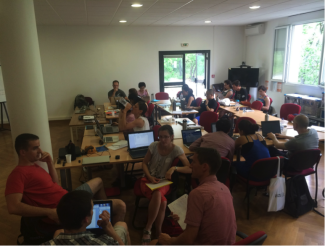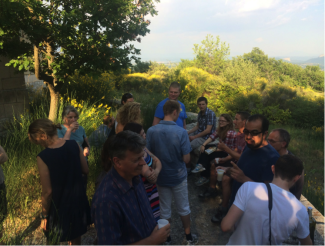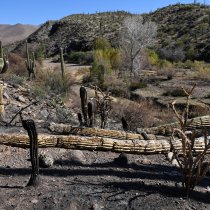Andy Fox on teaching next generation data users
July 17, 2015
While many NEON scientists are out of the office during the summer doing field work and installing sensors at NEON field sites, some are teaching next-generation data users.
This summer, Andy Fox - NEON scientist and member of the Data Products team - is participating in a number of summer school programs and workshops designed for advanced graduate students and university faculty. His teaching efforts focus on explaining NEON’s capabilities and sharing cutting edge techniques for combining NEON data with ecosystem models.
Tell us about the international workshop you recently taught.
I just returned from a teaching workshop held in France, run jointly between NEON and the Integrated Carbon Observation System (ICOS). The workshop concentrated on training early career scientists from over 10 different countries in the discovery and use of in-situ data, like that collected by NEON and ICOS, to address emerging issues in carbon cycle science including atmospheric science, biogeochemistry and ecosystem science.

Students discussing group project ideas at the NEON-ICOS Carbon Workshop June 2015, Observatoire de Haute-Provence, France
How can NEON data be used to improve ecosystem models?
The goal for the talks and exercises I led in this workshop was to get students to think about how to combine NEON data and environmental models in new and exciting ways. I led with some overview talks about NEON, including information about what data we will be producing and how that can be used in their own science. Next, I gave presentations on land surface modeling in global coupled climate-carbon models, like the Community Earth System Model. And then, I had the students put the concepts together. After a brief introduction to Bayesian approaches to improving ecosystem models, they did a hands-on practicum - investigating how the performance of a model simulating carbon and water fluxes could be improved by comparison with eddy covariance observations like NEON will be collecting at the flux towers at all NEON terrestrial field sites.
What are the advantages of attending a summer workshop or program?
Summer schools are normally very different from being in the classroom, with students and instructors spending many hours together each day, sharing meals and social time and on this occasion that was mandatory as we were at an isolated Observatory site, the nearest small village being several kilometers away. The heavy work schedule and constant interaction can be very tiring for students and instructors alike, but at the same time highly rewarding as the flow of information definitely goes both ways!

Students and Instructors enjoy evening sunshine before dinner on the terrace at the NEON-ICOS Carbon Workshop June 2015, Observatoire de Haute-Provence, France
Another advantage to many summer workshops and programs is that the costs are often subsidized or even free of charge to participants. For example, much of the instructor and student participation at the NEON-ICOS workshop was supported through an NSF Geosciences SAVI grant award for the COOPEUS project to NEON scientist Hank Loescher who organized the workshop.
What’s up next on your teaching schedule this summer?
Next week, I will be covering similar material at the 8th Annual Flux Course and presenting on flux measurement and advanced modeling. The workshop will be held at the University of Colorado Mountain Research Station which is the home of an LTER site and NEON’s Niwot Ridge field site. It will be another opportunity for providing insights into NEON data and data product development, as well as ecosystem modeling and data assimilation techniques.
Learn more about the upcoming courses and workshops Andy is leading this summer below:
- 8th Annual Flux Course
- NCAR CISL Environmental Analytics Graduate Workshop
- Frontiers in Ensemble Data Assimilation for Geoscience Applications Workshop
If you missed the application deadlines, then please stay tuned for next year’s workshops and summer school programs.
Stay tuned for 2016 NEON summer courses
NEON collaborates with a host of scientific and academic organizations to develop tutorials, videos and graphics that can be used to teach big data analysis techniques and concepts. Summer schools provide wonderful opportunities for students to learn state-of-the-art techniques from research leaders. Look out for relevant courses listed on the NEON website and social media.

